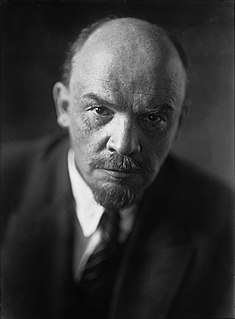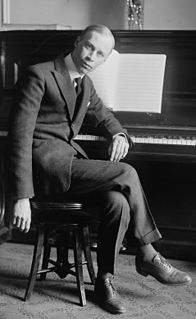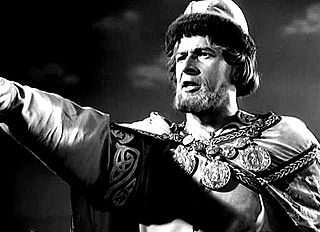
Leninism is a political ideology developed by Russian Marxist revolutionary Vladimir Lenin that proposes the establishment of the dictatorship of the proletariat, led by a revolutionary vanguard party, as the political prelude to the establishment of communism. The function of the Leninist vanguard party is to provide the working classes with the political consciousness and revolutionary leadership necessary to depose capitalism in the Russian Empire (1721–1917). Leninist revolutionary leadership is based upon The Communist Manifesto (1848) identifying the communist party as "the most advanced and resolute section of the working class parties of every country; that section which pushes forward all others." As the vanguard party, the Bolsheviks viewed history through the theoretical framework of dialectical materialism, which sanctioned political commitment to the successful overthrow of capitalism, and then to instituting socialism; and, as the revolutionary national government, to realize the socio-economic transition by all means.
A cantata is a vocal composition with an instrumental accompaniment, typically in several movements, often involving a choir.
Dmitri Shostakovich wrote his Symphony No. 2 in B major, Op. 14, subtitled To October, for the 10th anniversary of the October Revolution. It was first performed by the Leningrad Philharmonic Orchestra and the Academy Capella Choir under Nikolai Malko, on 5 November 1927. After the premiere, Shostakovich made some revisions to the score, and this final version was first played in Moscow later in 1927 under the baton of Konstantin Saradzhev. It was also the first time any version of the work had been played in Moscow.
The Symphony No. 11 in G minor, Op. 103, by Dmitri Shostakovich was written in 1957 and premiered by the USSR Symphony Orchestra under Natan Rakhlin on 30 October 1957. The subtitle of the symphony refers to the events of the Russian Revolution of 1905. However, the music may also reflect the Soviet invasion of Hungary, as the symphony was composed in the immediate aftermath of the events. Shostakovich himself was quoted saying "don't forget that I wrote the symphony in the aftermath of (the) Hungarian Uprising". The first performance given outside the Soviet Union took place in London's Royal Festival Hall on 22 January 1958 when Sir Malcolm Sargent conducted the BBC Symphony Orchestra. The US Premiere was given by Leopold Stokowski and the Houston Symphony Orchestra on 7 April 1958.

Reinhold Moritzevich Glière, was a Ukrainian composer of German and Polish descent.
Symphony No. 9 in E-flat major, Op. 70, was composed by Dmitri Shostakovich in 1945. It was premiered on 3 November 1945 in Leningrad by the Leningrad Philharmonic Orchestra under Yevgeny Mravinsky.
Dmitri Shostakovich’s Symphony No. 13 in B-flat minor, subtitled Babi Yar, was completed on July 20, 1962, and first performed in Moscow in December of that year. The hour-long work requires a bass soloist, men's chorus, and large orchestra and is laid out in five movements, each a setting of a Yevgeny Yevtushenko poem. This unusual form gives rise to various descriptions: choral symphony, song cycle, giant cantata. The five earthily vernacular poems denounce Soviet life one aspect at a time: brutality, cynicism, deprivation, anxiety, corruption. Kirill Kondrashin conducted the 1962 premiere after Yevgeny Mravinsky had declined the assignment under pressure; Vitaly Gromadsky sang the solo part alongside the combined choruses of the RSFSR State Academy and Gnessin Institute and the Moscow Philharmonic.

Symphony No. 4, Op. 47/112 is actually two works by Sergei Prokofiev. The first, Op. 47, was written in 1929 and premiered in 1930; it lasts about 22 minutes. The second, Op. 112, is a large-scale revision and lengthening from 1947; it lasts about 37 minutes. Both use musical material originally written for Prokofiev's ballet The Prodigal Son. The two works are stylistically different, reflecting their respective compositional contexts. They are formally different too: the instrumentation and scope of the revision is larger.

Alexander Nevsky is the score composed by Sergei Prokofiev for Sergei Eisenstein's 1938 film Alexander Nevsky. The subject of the film is the 13th century incursion of the knights of the Livonian Order into the territory of the Novgorod Republic, their capture of the city of Pskov, the summoning of Prince Alexander Nevsky to the defense of Rus', and his subsequent victory over the crusaders in 1242. The majority of the score's song texts were written by the poet Vladimir Lugovskoy.
Sergei Prokofiev's Symphony No. 7 in C-sharp minor, Op. 131, was completed in 1952, the year before his death. It is his last symphony.
Flourish, Mighty Land, Op. 114, is a cantata written by Sergei Prokofiev in 1947, to commemorate the 30th anniversary of the October Revolution, along with his Thirty Years.
Zdravitsa, Op. 85, is a cantata written by Sergei Prokofiev in 1939 to celebrate Stalin's 60th birthday. Its title is sometimes translated as Hail to Stalin in English. A performance lasts around thirteen minutes.

Georgy Vasilyevich Sviridov was a Soviet and Russian neoromantic composer. He is most widely known for his choral music, strongly influenced by the traditional chant of the Russian Orthodox Church, as well as his orchestral works which often celebrate elements of Russian culture. Sviridov employed, in his choral music especially, rich and dense harmonic textures, embracing a romantic-era tonality; his works would come to incorporate not only sacred elements of Russian church music, including vocal work for the basso profundo, but also display the influence of Eastern European folk music, 19th-century European romantic composers, as well as neoromantic contemporaries outside of Russia. He wrote musical settings of Russian Romantic-era poetry by poets such as Lermontov, Tyutchev and Blok. Sviridov enjoyed critical acclaim for much of his career in the USSR.

Music of the Soviet Union varied in many genres and epochs. The majority of it was considered to be part of the Russian culture, but other national cultures from the Republics of the Soviet Union made significant contributions as well. The Soviet state supported musical institutions, but also carried out content censorship. According to Lenin, "Every artist, everyone who considers himself an artist, has the right to create freely according to his ideal, independently of everything. However, we are Communists and we must not stand with folded hands and let chaos develop as it pleases. We must systemically guide this process and form its result."
Communism is a philosophical, social, political and economic ideology and movement whose ultimate goal is the establishment of a communist society, namely a socioeconomic order structured upon the ideas of common ownership of the means of production and the absence of social classes, money and the state.
The ideology of the Communist Party of the Soviet Union (CPSU) was Marxism–Leninism, an ideology of a centralised command economy with a vanguardist one-party state to realise the dictatorship of the proletariat. The Soviet Union's ideological commitment to achieving communism included the development of socialism in one country and peaceful coexistence with capitalist countries while engaging in anti-imperialism to defend the international proletariat, combat capitalism and promote the goals of communism. The state ideology of the Soviet Union—and thus Marxism–Leninism—derived and developed from the theories, policies and political praxis of Lenin and Stalin.
Democracy and Totalitarianism (1968) is a book by French philosopher and political scientist Raymond Aron. It compares the political systems of the Soviet Union and the democratic countries of the West.

Boris Yevseyevich Gusman (1892–1944) was a Soviet author, screenplay writer, theater director, and columnist for Pravda. As deputy director for the Bolshoi Theatre and later director of the Soviet Radio Committee Arts Division, Gusman played an important role in promoting Sergei Prokofiev's music in the USSR and internationally. Gusman was arrested during the Great Purges of the late 1930s, and died in a labor camp in 1944. His son Israel Borisovich Gusman would later become a prominent musical conductor.
A socialist state, socialist republic, or socialist country, sometimes referred to as a workers' state or workers' republic, is a sovereign state constitutionally dedicated to the establishment of socialism. The term communist state is often used synonymously in the West specifically when referring to one-party socialist states governed by Marxist–Leninist communist parties, despite these countries being officially socialist states in the process of building socialism. These countries never describe themselves as communist nor as having implemented a communist society. Additionally, a number of countries that are multi-party capitalist states make references to socialism in their constitutions, in most cases alluding to the building of a socialist society, naming socialism, claiming to be a socialist state, or including the term people's republic or socialist republic in their country's full name, although this does not necessarily reflect the structure and development paths of these countries' political and economic systems. Currently, these countries include Algeria, Bangladesh, Guyana, India, Nepal, Nicaragua, Portugal, Sri Lanka and Tanzania.







